Microsoft 70-741 Networking with Windows Server 2016 Online Training
Microsoft 70-741 Online Training
The questions for 70-741 were last updated at Feb 19,2026.
- Exam Code: 70-741
- Exam Name: Networking with Windows Server 2016
- Certification Provider: Microsoft
- Latest update: Feb 19,2026
Note: This question is part of a series of questions that present the same scenario. Each question in the series contains a unique solution that might meet the stated goals. Some question sets might have more than one correct solution, while others might not have a correct solution.
After you answer a question in this sections, you will NOT be able to return to it. As a result, these questions will not appear in the review screen.
You network contains an Active Directory domain named contoso.com. The domain contains a DHCP server named Server1. All client computers run Windows 10 and are configured as DHCP clients.
Your helpdesk received calls today from users who failed to access the network from their Windows 10 computer.
You open the DHCP console as shown in the exhibit. (Click the Exhibit button.)
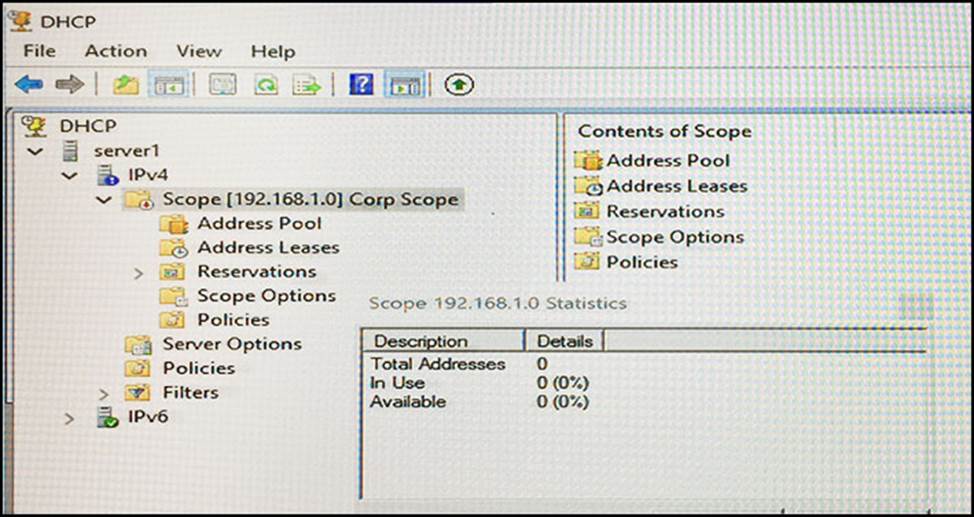
You need to ensure that all of the Windows 10 computers can receive a DHCP lease.
Solution: You increase the scope size.
Does this meet the goal?
- A . Yes
- B . No
Note: This question is part of a series of questions that present the same scenario. Each question in the series contains a unique solution that might meet the stated goals. Some question sets might have more than one correct solution, while others might not have a correct solution.
After you answer a question in this sections, you will NOT be able to return to it. As a result, these questions will not appear in the review screen.
You network contains an Active Directory domain named contoso.com. The domain contains a DHCP server named Server1. All client computers run Windows 10 and are configured as DHCP clients.
Your helpdesk received calls today from users who failed to access the network from their Windows 10 computer.
You open the DHCP console as shown in the exhibit. (Click the Exhibit button.)
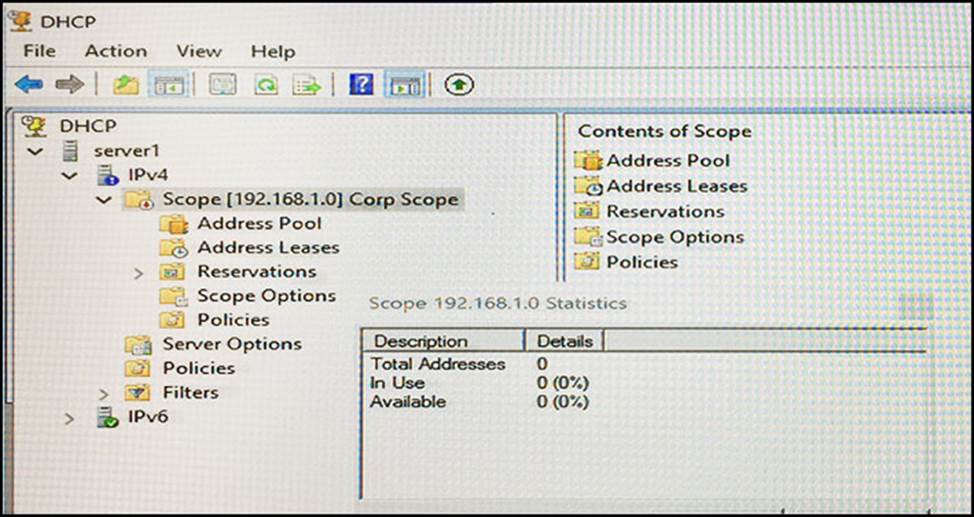
You need to ensure that all of the Windows 10 computers can receive a DHCP lease.
Solution: You start the DHCP Server service.
Does this meet the goal?
- A . Yes
- B . No
Note: This question is part of a series of questions that present the same scenario. Each question in the series contains a unique solution that might meet the stated goals. Some question sets might have more than one correct solution, while others might not have a correct solution.
After you answer a question in this sections, you will NOT be able to return to it. As a result, these questions will not appear in the review screen.
You network contains an Active Directory domain named contoso.com. The domain contains a DHCP server named Server1. All client computers run Windows 10 and are configured as DHCP clients.
Your helpdesk received calls today from users who failed to access the network from their Windows 10 computer.
You open the DHCP console as shown in the exhibit. (Click the Exhibit button.)
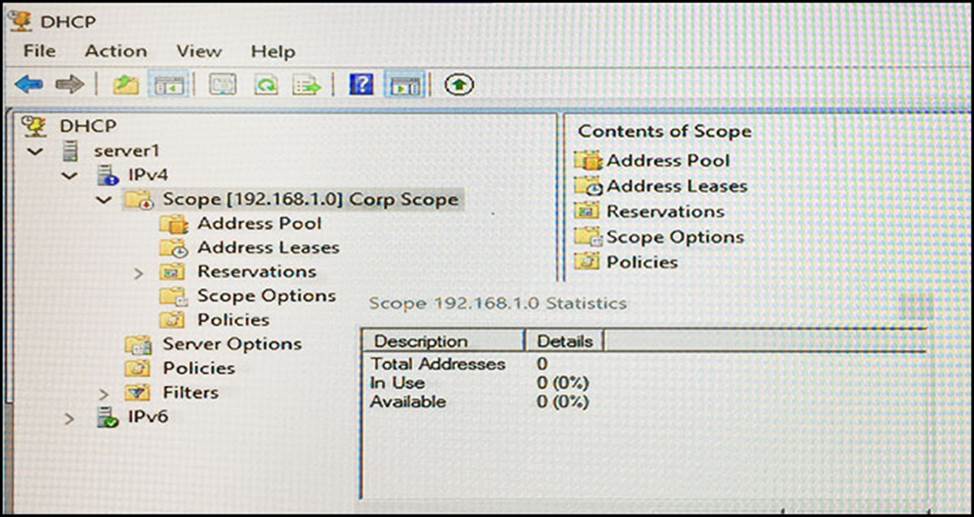
You need to ensure that all of the Windows 10 computers can receive a DHCP lease.
Solution: You activate the scope.
Does this meet the goal?
- A . Yes
- B . No
Note: This question is part of a series of questions that present the same scenario. Each question in the series contains a unique solution that might meet the stated goals. Some question sets might have more than one correct solution, while others might not have a correct solution.
After you answer a question in this sections, you will NOT be able to return to it. As a result, these questions will not appear in the review screen.
You network contains an Active Directory domain named contoso.com. The domain contains a DHCP server named Server2 than runs Windows Server 2016. Users report that their client computers fail to obtain an IP address.
You open the DHCP console as shown in the Exhibit. (Click the Exhibit button.)
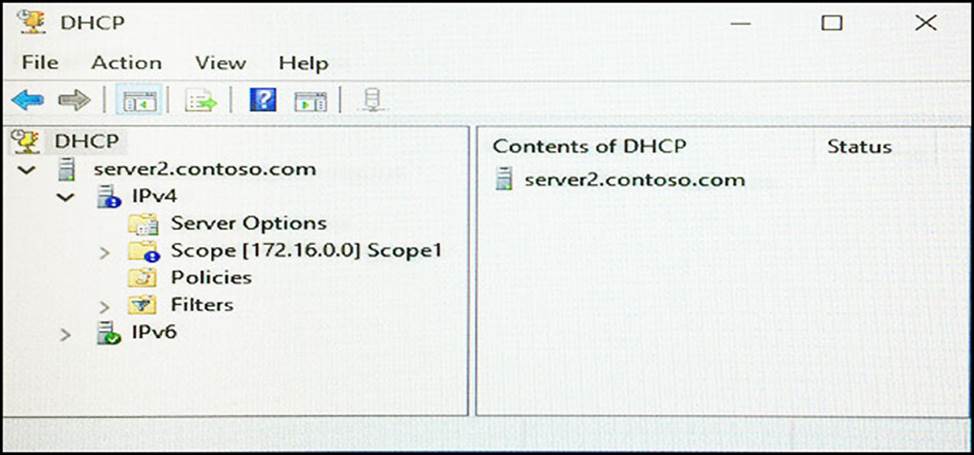
Scope1 has an address range of 172.16.0.10 to 172.16.0.100 and a prefix length of 23 bits.
You need to ensure that all of the client computers on the network can obtain an IP address from Server2.
Solution: You run the Repair-DhcpServerv4IPRecord cmdlet.
Does this meet the goal?
- A . Yes
- B . No
Note: This question is part of a series of questions that present the same scenario. Each question in the series contains a unique solution that might meet the stated goals. Some question sets might have more than one correct solution, while others might not have a correct solution.
After you answer a question in this sections, you will NOT be able to return to it. As a result, these questions will not appear in the review screen.
You network contains an Active Directory domain named contoso.com. The domain contains a DHCP server named Server2 than runs Windows Server 2016.
Users report that their client computers fail to obtain an IP address.
You open the DHCP console as shown in the Exhibit. (Click the Exhibit button.)
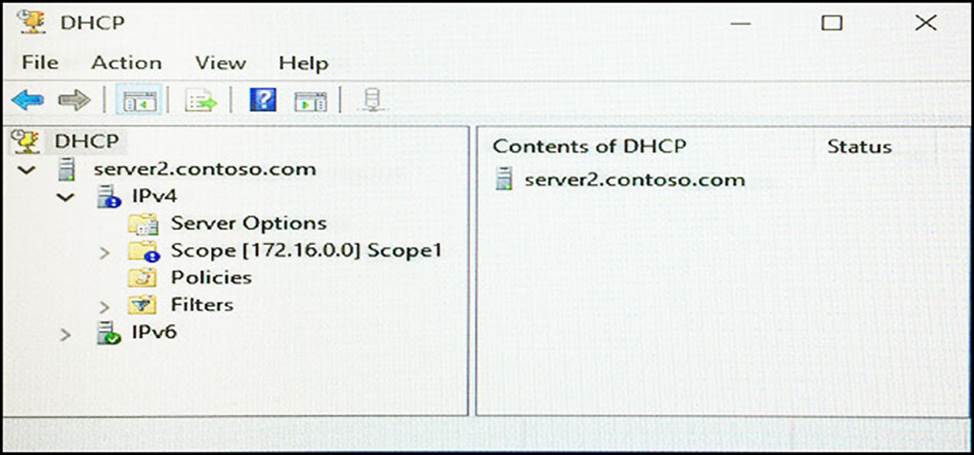
Scope1 has an address range of 172.16.0.10 to 172.16.0.100 and a prefix length of 23 bits.
You need to ensure that all of the client computers on the network can obtain an IP address from Server2.
Solution: You run the Reconcile-DhcpServerv4IPRecord cmdlet.
Does this meet the goal?
- A . Yes
- B . No
Note: This question is part of a series of questions that present the same scenario. Each question in the series contains a unique solution that might meet the stated goals. Some question sets might have more than one correct solution, while others might not have a correct solution.
After you answer a question in this sections, you will NOT be able to return to it. As a result, these questions will not appear in the review screen.
You network contains an Active Directory domain named contoso.com. The domain contains a DHCP server named Server2 than runs Windows Server 2016.
Users report that their client computers fail to obtain an IP address.
You open the DHCP console as shown in the Exhibit. (Click the Exhibit button.)
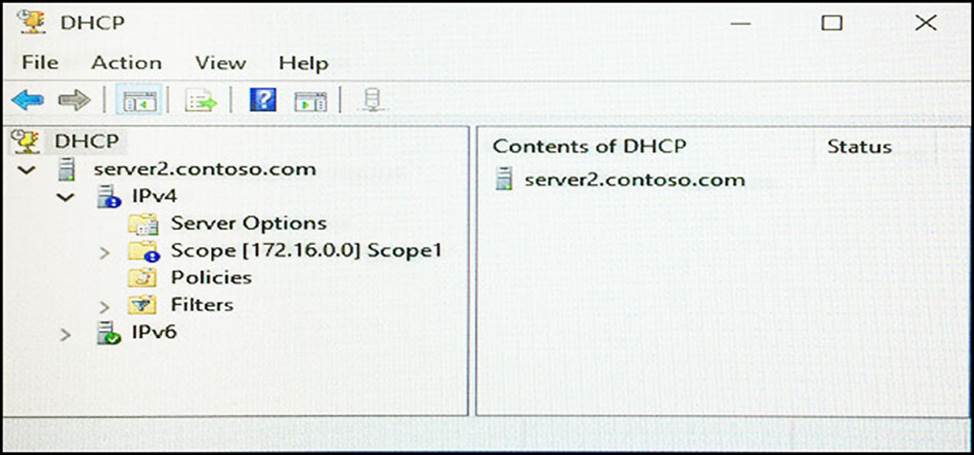
Scope1 has an address range of 172.16.0.10 to 172.16.0.100 and a prefix length of 23 bits.
You need to ensure that all of the client computers on the network can obtain an IP address from Server2.
Solution: You run the Set-DhcpServerv4Scope cmdlet.
Does this meet the goal?
- A . Yes
- B . No
Note: This question is part of a series of questions that present the same scenario. Each question in the series contains a unique solution that might meet the stated goals. Some question sets might have more than one correct solution, while others might not have a correct solution.
After you answer a question in this sections, you will NOT be able to return to it. As a result, these questions will not appear in the review screen.
You network contains an Active Directory domain named contoso.com. The domain contains a member server named Server1 that runs Windows Server 2016 and has the DNS Server role installed. Automatic scavenging of state records is enabled and the scavenging period is set to 10 days.
All client computers dynamically register their names in the contoso.com DNS zone on Server1.
You discover that the names of multiple client computers that were removed from the network several weeks ago can still be resolved.
You need to configure Server1 to automatically remove the records of the client computers that have been offline for more than 10 days.
Solution: You run the dnscmd.exe command and specify the /AgeAllRecords parameter for the zone.
Does this meet the goal?
- A . Yes
- B . No
Note: This question is part of a series of questions that present the same scenario. Each question in the series contains a unique solution that might meet the stated goals. Some question sets might have more than one correct solution, while others might not have a correct solution.
After you answer a question in this sections, you will NOT be able to return to it. As a result, these questions will not appear in the review screen.
You network contains an Active Directory domain named contoso.com. The domain contains a member server named Server1 that runs Windows Server 2016 and has the DNS Server role installed. Automatic scavenging of state records is enabled and the scavenging period is set to 10 days.
All client computers dynamically register their names in the contoso.com DNS zone on Server1.
You discover that the names of multiple client computers that were removed from the network several weeks ago can still be resolved.
You need to configure Server1 to automatically remove the records of the client computers that have been offline for more than 10 days.
Solution: You set the Time to live (TTL) value of all of the records in the zone.
Does this meet the goal?
- A . Yes
- B . No
Note: This question is part of a series of questions that present the same scenario. Each question in the series contains a unique solution that might meet the stated goals. Some question sets might have more than one correct solution, while others might not have a correct solution.
After you answer a question in this sections, you will NOT be able to return to it. As a result, these questions will not appear in the review screen.
You network contains an Active Directory domain named contoso.com. The domain contains a member server named Server1 that runs Windows Server 2016 and has the DNS Server role installed. Automatic scavenging of state records is enabled and the scavenging period is set to 10 days.
All client computers dynamically register their names in the contoso.com DNS zone on Server1.
You discover that the names of multiple client computers that were removed from the network several weeks ago can still be resolved.
You need to configure Server1 to automatically remove the records of the client computers that have been offline for more than 10 days.
Solution: You modify the Zone Aging/Scavenging properties of the zone.
Does this meet the goal?
- A . Yes
- B . No
Note: This question is part of a series of questions that present the same scenario. Each question in the series contains a unique solution. Determine whether the solution meets the stated goals.
Your network contains an Active Directory domain named contoso.com. The domain contains a DNS server named Server1. All client computers run Windows 10.
On Server1, you have the following zone configuration.

You have the following subnets defined on Server1.

You need to prevent Server1 from resolving queries from DNS clients located on Subnet4. Server1 must resolve queries from all other DNS clients.
Solution: From a Group Policy object (GPO) in the domain, you modify the Network List Manager Policies.
Does this meet the goal?
- A . Yes
- B . No
Latest 70-741 Dumps Valid Version with 259 Q&As
Latest And Valid Q&A | Instant Download | Once Fail, Full Refund


Thanks
thx